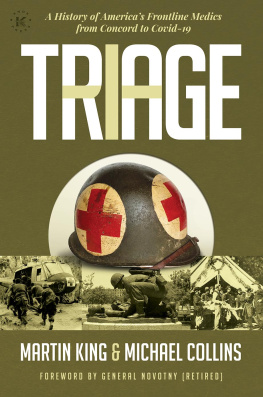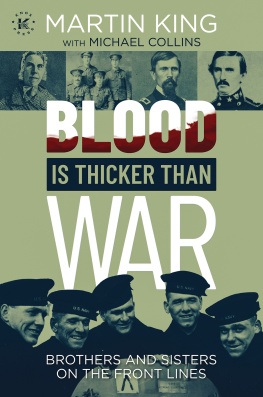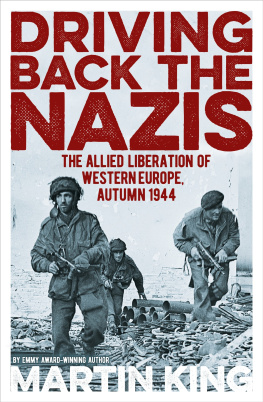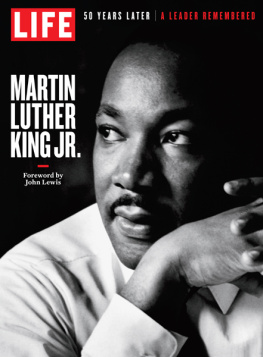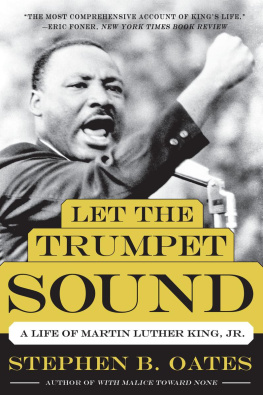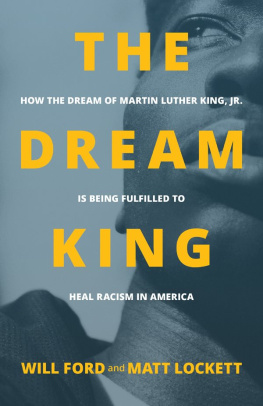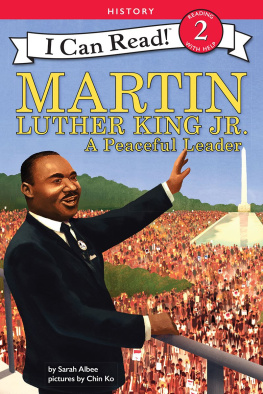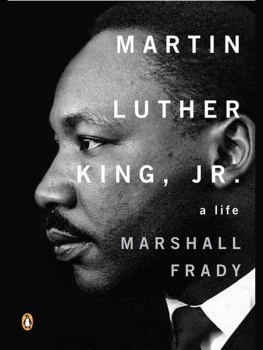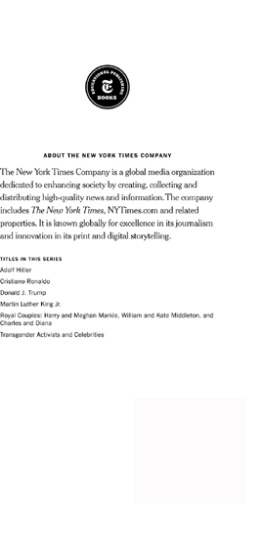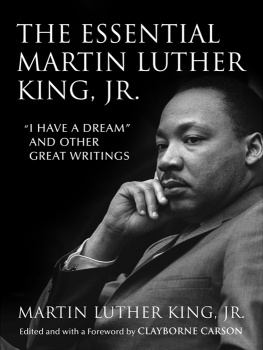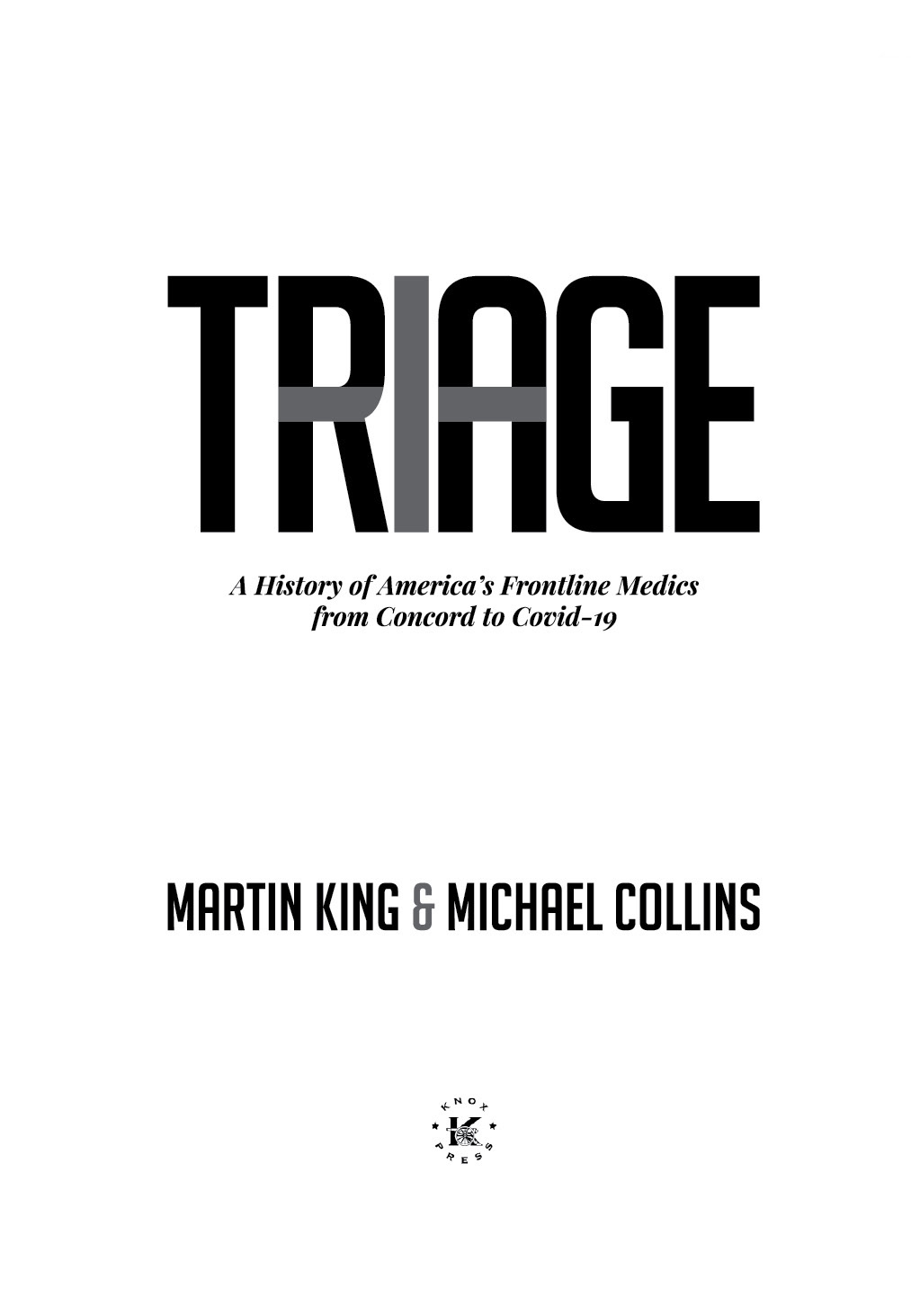Advance Praise for Triage
One of the joys of studying history is that people emerge from the shadows, whose actions that would otherwise have been forgotten, and demand our attention. The experiences of frontline medics revealed in full by the energetic researches of Martin King, who has demonstrated that they should be counted as historys true heroes.
Peter Snow, historian, author, and host of th Century Battlefields
Martins stories reminds me of that which the soldiers in the 327 th Infantry Brigade, 101 st Airborne Division hold dear: selflessness, duty, and commitment. Medics are a shining example of these attributes and these stories reminds all of us in uniform that we must never forget the sacrifice and service of those who came before us. This is a must-read for anyone, and also those who have served, as well as their loving, supportive families.
Colonel Rob Campbell (Retired), Commander, 327 th Infantry Regiment, 1 st Brigade Combat Team, 101 st Airborne Division (Air Assault)
Thanks to the passion and determination of Martin King to deliver the extraordinary details of these modern-day saints. Frontline medics do the right thing even in the face of hell!
Helen Patton, granddaughter of General George Patton
This volume is dedicated to my dear friends Randy and Staci Garcia and the wonderful staff at ICC.
A KNOX PRESS BOOK
An Imprint of Permuted Press
ISBN: 978-1-64293-976-7
ISBN (eBook): 978-1-64293-977-4
Triage:
A History of Americas Frontline Medics from Concord to Covid-19
2021 by Martin King and Michael Collins
All Rights Reserved
Cover art by Cody Corcoran
Back cover photo by Nurse Allycia King
No part of this book may be reproduced, stored in a retrieval system, or transmitted by any means without the written permission of the author and publisher.

Permuted Press, LLC
New York Nashville
permutedpress.com
Published in the United States of America
Contents
In my thirty years of flying combat fighter aircrafts, with five deployments to the Middle East and Afghanistan, I can tell you from personal experience that there are few treatments for the apprehension that fills your soul prior to war. Three things come to mind that can act as a mild remedy: First, the effectiveness and recency of your units training for combat. Second, the camaraderie and cohesiveness of the warfighting team. And finally, the knowledge that if you are wounded in war, there stands ready an amazing team of military combat physicians who will care for you, return you to your unit, or send you home to your family alive. 2021 marks the twentieth straight year of sustained combat operations in Afghanistan, and it is widely held that a revolution in military medicine has gone almost undetected. Credit to these military medics is well overdue, and the low numbers of combat casualties are but one metric to grade their success. While deployed, we spoke to military medical planning with the terms Platinum 15 and the Golden Hour. It was indisputable that if a military medic could attend to a wounded service member within fifteen minutes of initial injury, the likelihood of survival rocketed close to 95 percent. Furthermore, if that wounded service member was evacuated from the battlefield and transported to a combat medical facility within the first Golden Hour, the results were even more noteworthy. This is a story worth telling and Martin King does exactly that in his newest historical work Triage . I met Martin in early 2019 when we both spoke at a military historical event in Las Vegasa mere week or less before the United States began to restrict activities in response to the growing COVID-19 pandemic. His timely novel documenting the heroic work of military medics spans from the early American experiences in the pre-industrial age of warfare to the frontline caregivers fighting the pandemic in our very midst. Martin is a keen studier of war and an incredible storyteller, especially those stories that have had profound impacts on the lives of others. Triage is the story of those heroes.
Robert G. Novotny, Brig Gen (ret), USAF
Just out of interest, triage is the medical process of determining the priority of patients treatments by the severity of their condition, or likelihood of recovery with and without treatment. In other words, a person with suitable medical qualifications walks among the afflicted and determines whether or not someone should or shouldnt buy green bananas. The problem was that in the past the person charged with this great responsibility wasnt, as we will discover, always the right person for the job.
This volume begins and ends in the New World. While at the time of writing millions remain at home to minimize transmission of a severe acute respiratory syndrome aka COVID-19, across the states and around the world healthcare workers prepare to do the precisely the opposite. Social distancing demurs physical contact, but these remarkable individuals will put themselves in harms way in the clinics, hospitals, and care homes or wherever they are sent. Numerous reports from medical staff describing the torment of difficult triage decisions and the anguish of losing patients and colleagues amount to a lexicon of physical and mental torment almost equivalent to a battlefield experience. They might not have to brave bullets and shrapnel, but they are confronted daily with the additional risk of infection. These angels carry on undeterred. This volume is a tribute to them, to the front line teams that have been saving lives since the American Revolutionary War. So while the world is being ravaged by this pandemic, what better excuse does one need to stay home and read a book?
The story begins in the days when the status of some women was gradually evolving from that of domestic pet and potential witch to essential caregiver on the battlefront. In the 18th century surgeons and nurses became an imperative rather than an additional luxury to armies in the field, where their intrinsic value far exceeded the paltry remuneration they received for their efforts to keep soldiers breathing. So not much has changed there. The nurses worked tirelessly alongside surgeons to patch up the wounded and either send them home, get them back on the front lines, or measure them up for a wooden overcoat. Not much has changed there either. Despite having little more than common sense and good housekeeping skills, these first impromptu nurses often had to serve under the auspices of grossly incompetent physicians (but men were always right back then, werent they?).
Its almost a paradox that in the beginning, Americas front line medical staff was comprised mostly of civilians, assisted by the military. Now, over three hundred years later, that appears to be the case again. Only this time no one can see the enemy, but they can see the terrible damage it can inflict on the victims. They can see the stricken faces of bereaved relatives who dont even have the luxury of sharing those last vital hours on earth with their loved ones in proximity. Relatives are forbidden from holding a hand or tenderly cradling the head of someone struggling to breathe their last breath, but the doctors and nurses arent confined by such restrictions.
Front line medical teams are consummate experts at internalizing their grief, it goes with the turf, and this has always been the case. The fact that military medics are at higher risk of burnout, compassion fatigue, combat stress, and medic PTSD than their fellow combat personnel also applies to civilian health workers. They absorb the anguish and pain close relatives of the victims cant see, and they share their sadness and carry on regardless, repeating the same heart-rending processes day in day out. Nevertheless, a war is a war, and an enemy remains an enemy until it is neutralized or completely eradicated.

